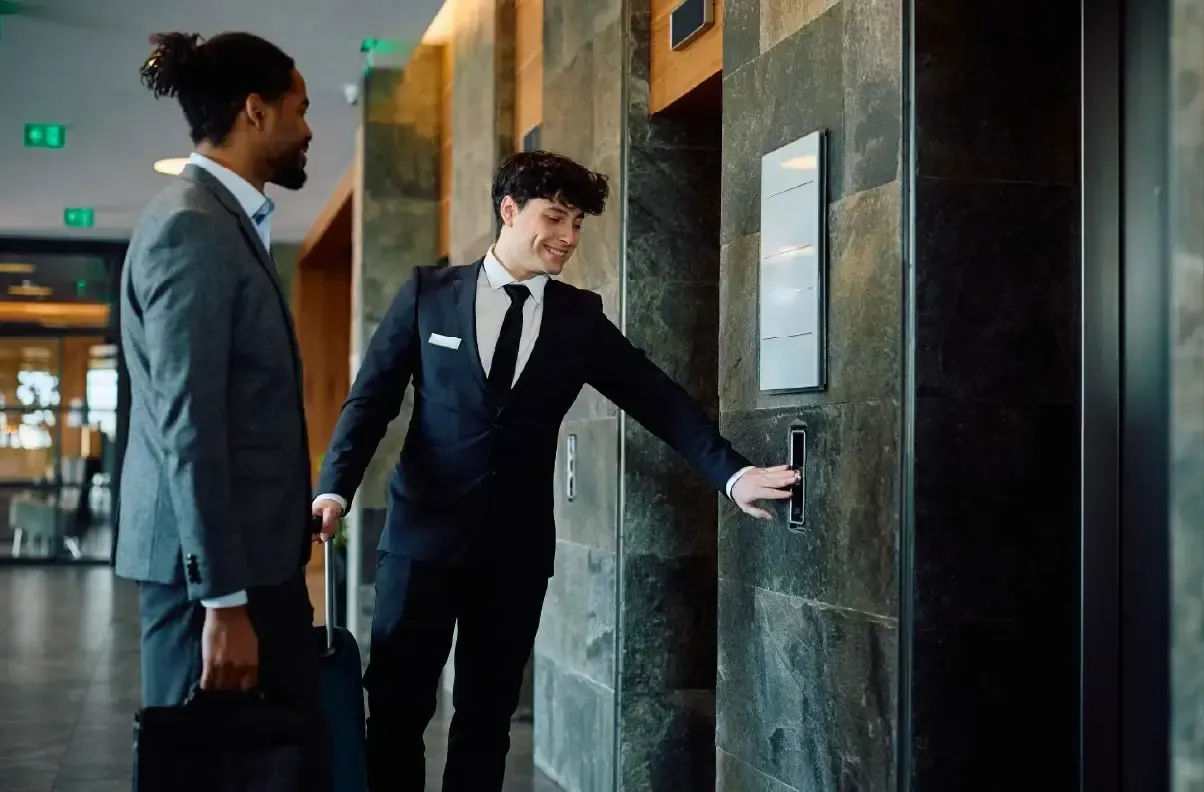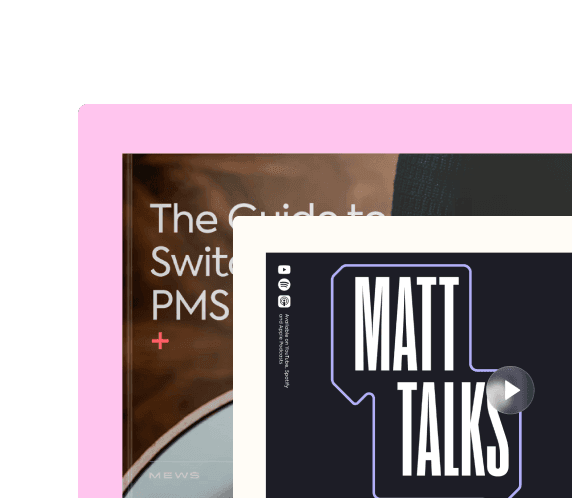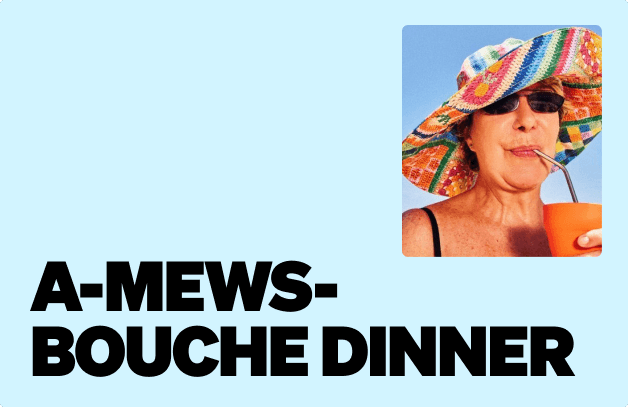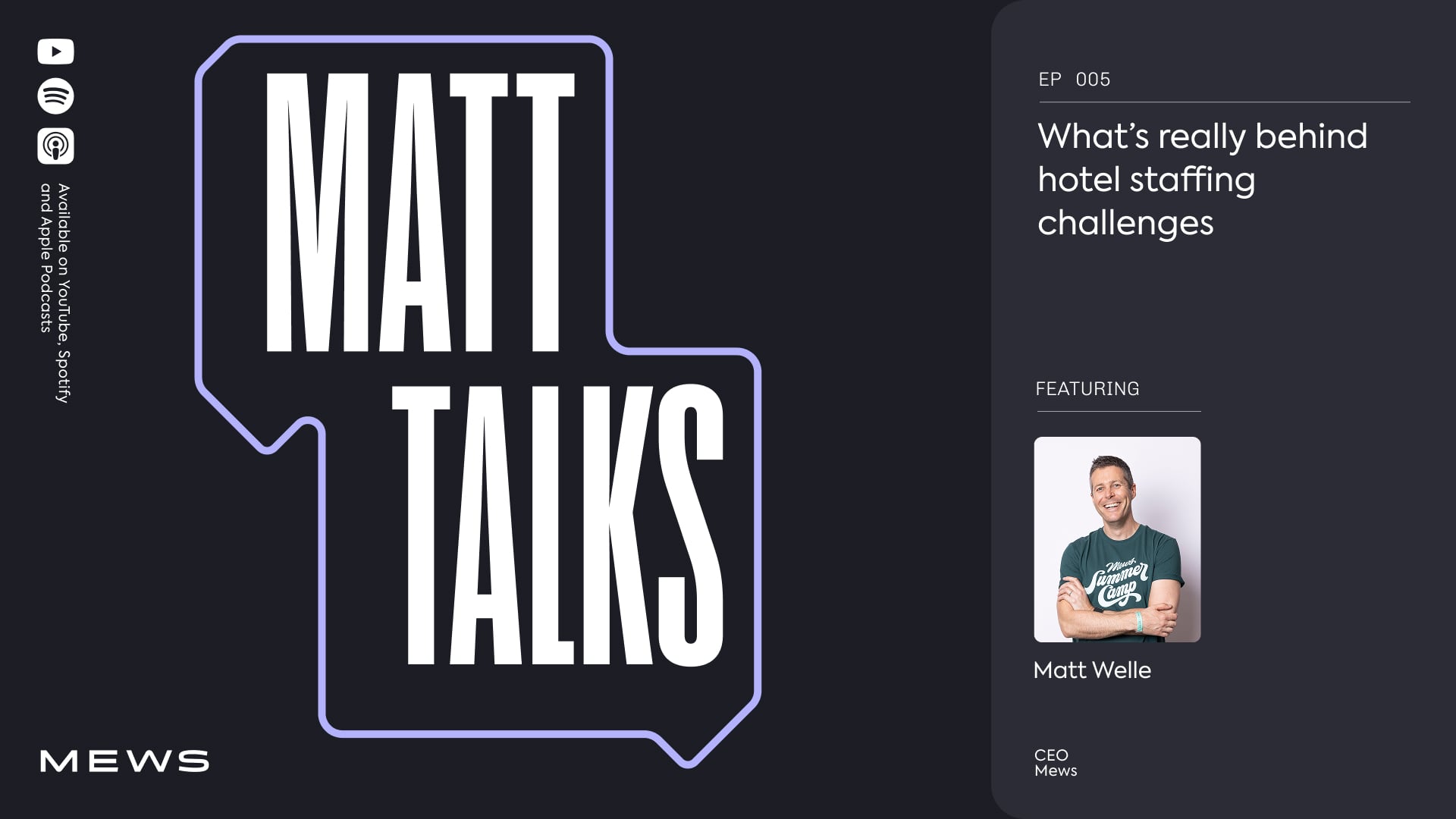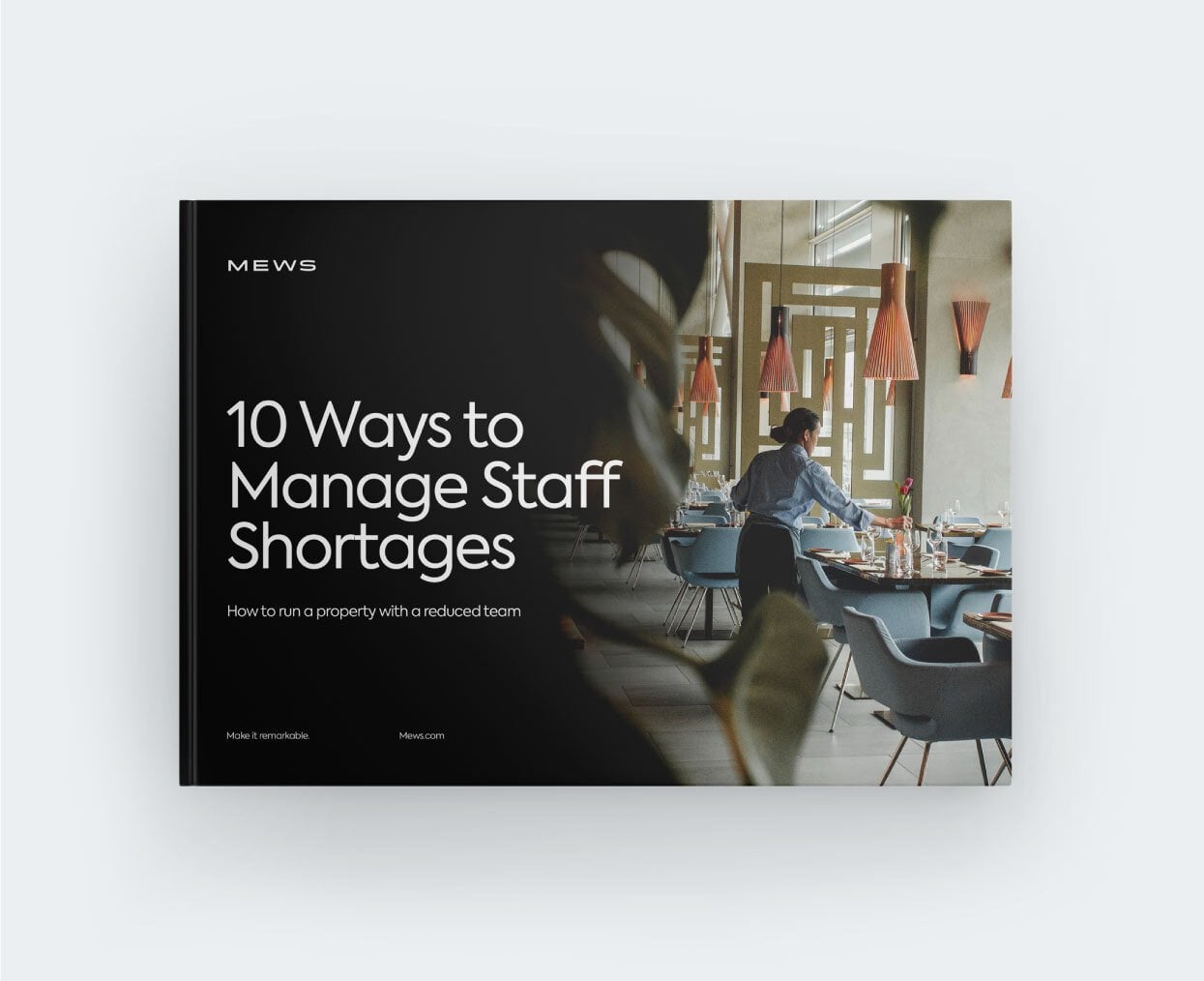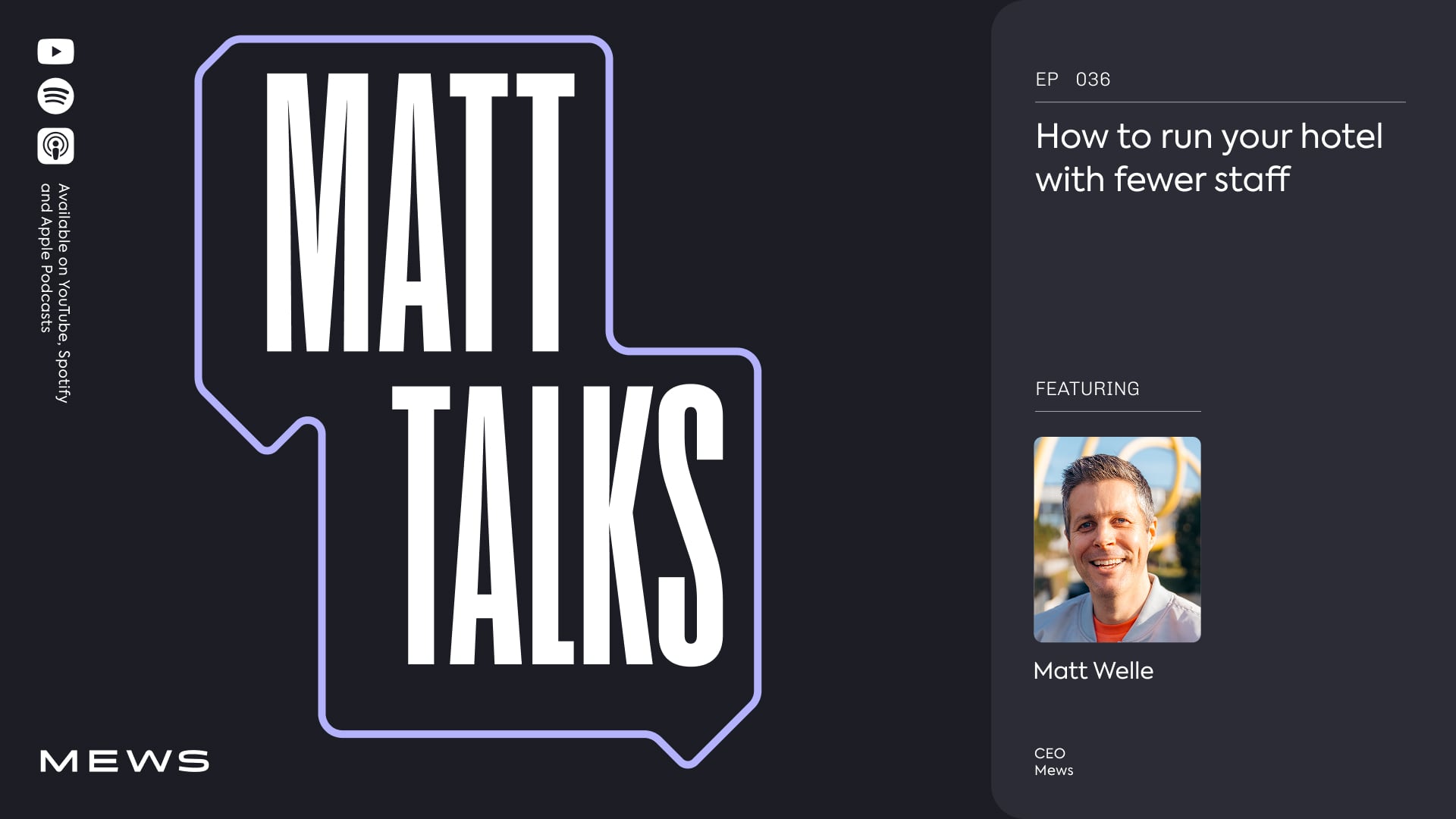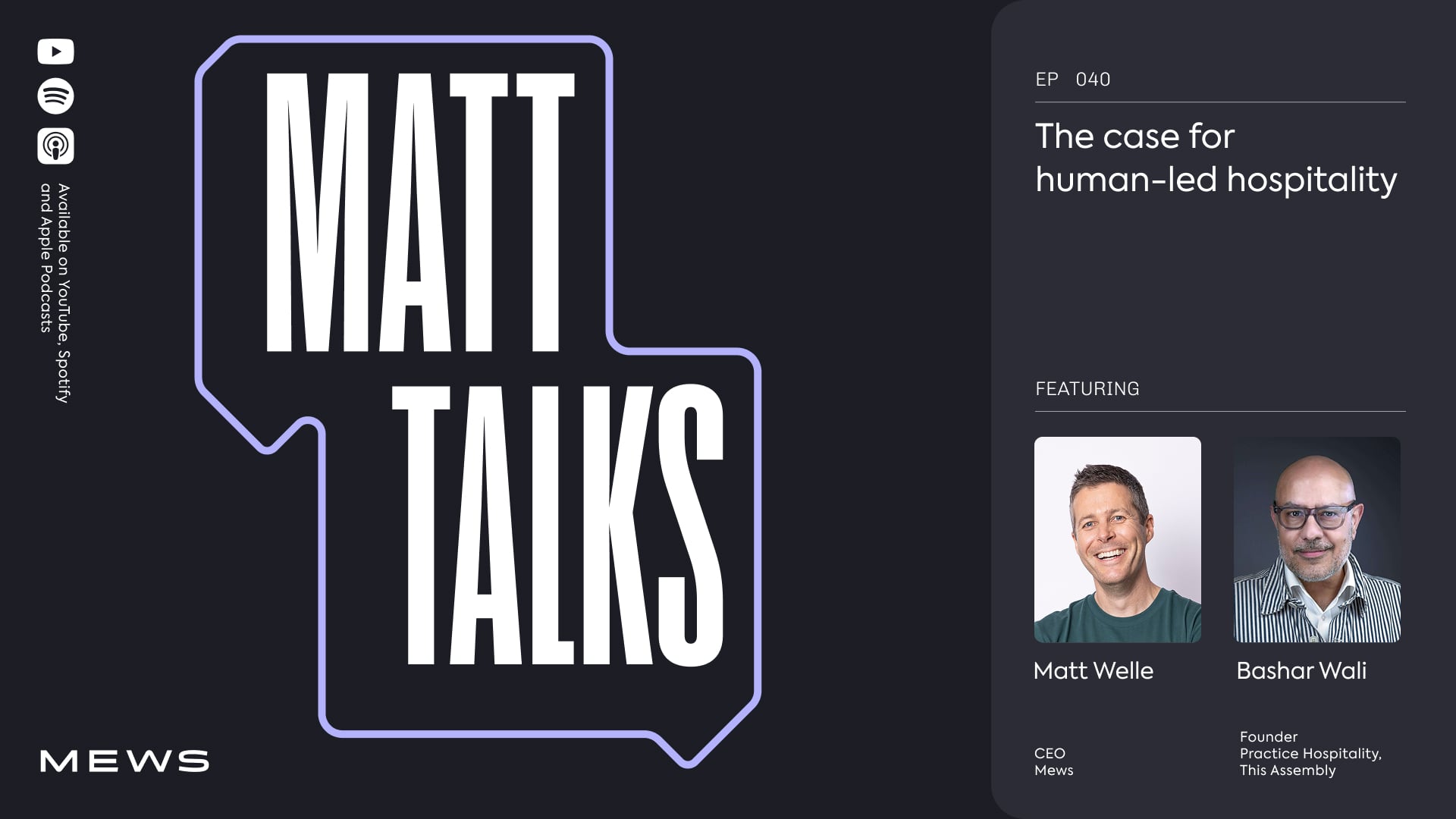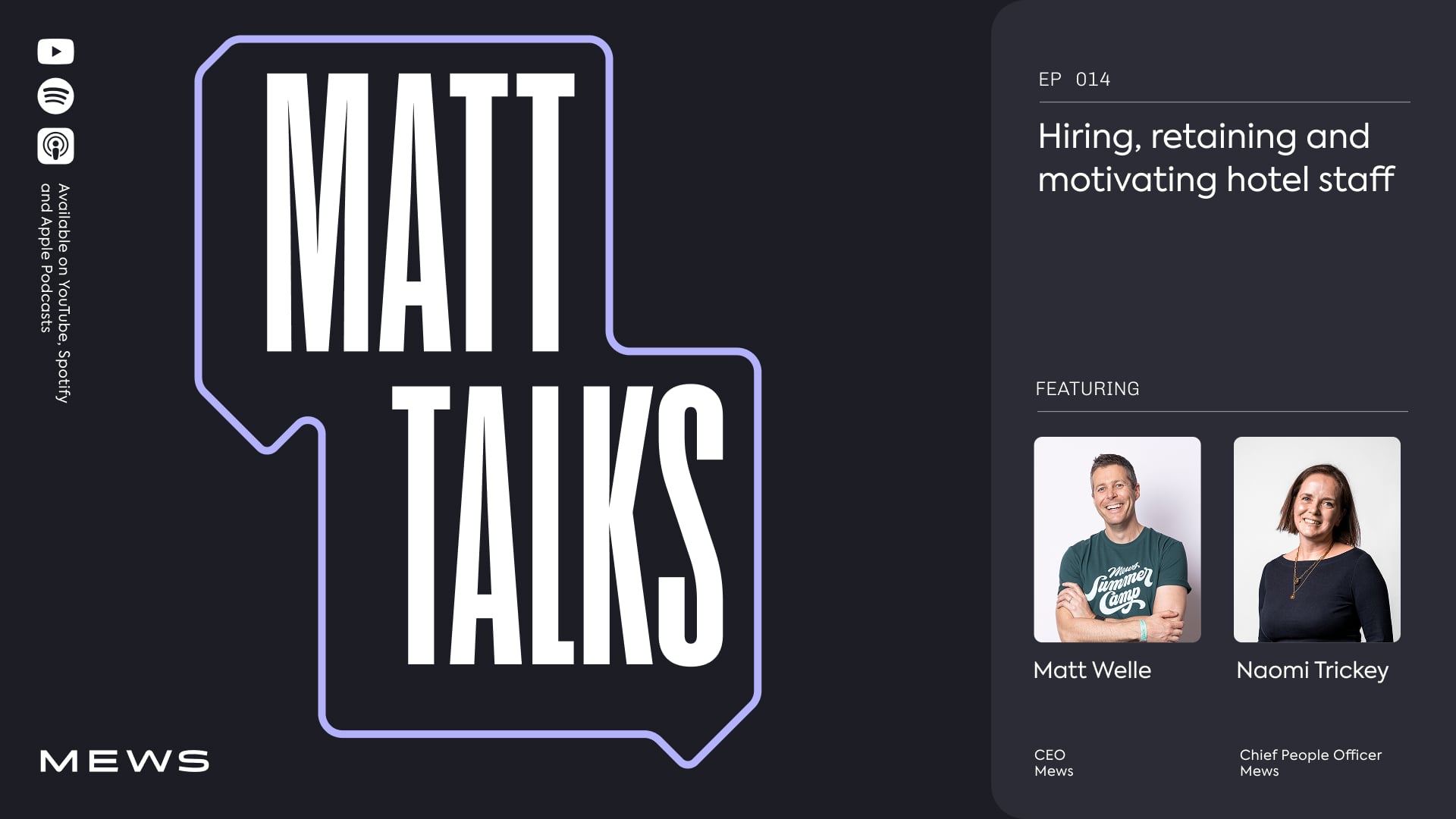What to expect?
Meet your host

Matthijs Welle
CEO, Mews
After years in the trenches of hospitality, Matt joined the Mews journey during its early days in 2013. Since then, he’s been our fearless CEO, leading the company and the industry forward.
Episode chapters
Transcript
Introduction
Hi, everyone. My name is Matt. I'm the CEO of Mews, and I do these Mews or Matt Talks, where I try and share, my opinion and my views on a bunch of different topics that, whatever has come up, recently that that sparked my mind. And, they're all related obviously to hospitality, and challenges that we're facing in hospitality or, innovations that we're leaning into. One of the things that we've obviously experienced was the staff shortages of COVID. We saw when hotels shut down that people had to find other jobs in other industries, and they did. And they didn't wanna come back because, you know, the the hours that we make are sometimes crazy.
The pay isn't always good. We're not known for paying well. And a lot of the jobs aren't particularly fun, because of the types of systems that we use. And it's a lot of admin, entry that we're doing. And, actually, the fun part is talking to the humans, and that's what makes the the job more valuable. So I thought I'd do a session on staff shortages, and I'm going to, obviously, talk about the innovation on technology and how you can leverage that innovation towards staff shortages. However, at the same time, I wanna dig into the experiences that I've had working in hotels as a manager, and now obviously leading a large tech company that we've scaled from literally four guys in a basement to twelve hundred people across twenty countries in a remote environment, and how do you drive engagement of that culture?
The other day, we had a customer join us on our all hands. We have a weekly all hands, at Mews where everyone dials in. And once every so often, we invite a customer to join us and tell us their experiences of Mews or of the, how we interact with that customer. And we had UDS, which is a hotel chain in Japan, and Genki joined us. And he talked about how transformative Mews had been to their staffing situation, which I hadn't specifically heard in that the way that he described it. He said we have zero turnover on staff.
And another thing that, you know, Mews helped drive was an excitement because we started to hire a very different type of candidate because we didn't need, system administrators, people with experience of the system. We actually started looking for more generalists.
And, you know, then you can look for personalities, like really great strong personalities that drive great experiences.
And he said there's been a real shift in culture across the business. The lack of turnover means that people have more experience and they're really effective at their job. And that's, you know, partly because they deployed a modern system across their hotels. And, and it was just nice to hear it from from a customer rather than us talking about it. Sometimes it's the best and most powerful thing if a customer says this to you. So in this, set of videos today, I I will talk about staff shortages because we are we have experienced this post COVID, and it hasn't fully rebounded.
And there are several things you can do. Some of that sits on the automation side, on the system side.
Some of that is a shift towards a different type of person that you should be bringing in.
Driving a purpose led culture. And then lastly, I'll talk about, Unreasonable Hospitality, a book that I recently read which really feeds into this perfectly. And you actually see it up there. That's that's a book that I love. I keep sending it to customers whoever whenever I speak to great customers.
But that's kind of the, the the the four bigger topics and themes that I'll talk about in this series of, discussions around staff shortages.
Chapter
The shift from hotel specialists to generalists
So in this first block, I wanted to talk about, hiring specialist versus more generalists. I think that's the biggest shift, that we've seen because of modern technology coming into hotels.
And it's it's a really important shift that if you lean into it, it could really drive a tremendous outcome to your hotel. So traditionally, if you think about, hoteliers that we're putting on the front desk, for example, we had to find people that had experience because the systems are so complex. If I still go into some of the big brands and I look over the screen, like, oh, that's that system from, you know, the nineties that hasn't really seen an innovation.
And if you have a legacy system, it takes a couple of weeks to get really comfortable. So you're and during that time, you know, these people are frustrated and it takes a long time to get up to speed. And your guests are not getting a great experience. And there's a lot of turnover in these jobs because they become specialists.
They all they do is check-in and check out, check-in and check out, day in day out. And after a while, you burn them out because they they don't that's not the job that they thought they were going into when they went to hospitality. They thought they were gonna talk to guests about genuine guest experiences. But really, they're just talking about asking for credit cards, filling in registration cards, selling them where the breakfast room is and, you know, what time the gym opens.
And that's where the shift needs to happen. The automation of the a modern system, can make sure that if you can move seventy percent of that work away from the, the the front desk people, they get to do a very different job which is really talking to guests and having a a real conversation and capturing in that information. So they go from being very specialized into the knowing the system to to guest delivery agents or something like whatever you you guest happiness officers, for example.
And what this shift does is you start to hire for generalists, meaning you're not looking for a skill set of systems. You're looking for personality.
And that opens up your hiring pool because really just looking at any education background, you just really wanna get the the the people with the greatest personality in the house because the technology part, you can teach them.
What we've seen for example, there is a great company because when you start to open up the pool saying, you know, I don't really need previous experience. I just really want the best people of any age. I don't really mind.
Your pool increases, so you see more people applying for jobs. You've got a great company called, like, Test Gorilla, for example, where they do pretesting. So when people apply, you can have some tests run so that you can specifically look for personality traits for example or for language skills or whatever skill that you want.
The Test Gorilla can kind of do the preselection for you before they hit the actual interview.
Another real thing that you see with modern systems is that they are mobile friendly. Meaning, where traditionally you'd have a bellboy at the door, you'd have a, reception desk where you have the res reception agents, then you'd still have a concierge desk as well, possibly a guest relations desk. And all of these roles you can now combine because really, they're fluid because I can be, as a receptionist, at the door, welcome customers. I can sit them down in the lobby on my smart tablets or if they've checked in themselves already, you don't even need to do that. And even concierge with AI, what a concierge adds is not what they used to do. So you can bring all of that into a single role, making the role more diverse, meaning that guests that that, your team members are actually really getting much more enjoyment out of it and hopefully sticking around longer, which is when you get the real value out of it.
Another big thing that we've seen is that the amount of admin at the end of the shift goes down. I worked in hotels before. I worked at a large hotel of eight hundred rooms. And, you know, when you have a busy check-in day, you end up going to the back office at the end of your shift and updating profiles because all these reg cards that you just didn't get time to update, you still have to go and update. And all of that admin, is actually adding unpaid time to your shift, which is or or you're rushing it and it causes more stress, and people don't enjoy that. So if we can remove that admin through automation, it's gonna be really powerful.
And then lastly, if you can, drive more automation, that means you don't necessarily need as many people. You just need better people. So if you can drive cost savings, on the one side, sure, you can put the cost savings into your pocket, but you could also invest it into paying above market, because what we learned in COVID is that people didn't wanna come back to our hotels because we didn't pay them fairly. And they realized they can get paid in other jobs fairly. So if we can do, more with less people, that means you could pay more. And if you pay above market, the amount of applications that are coming in is significantly going to increase, if you obviously talk publicly about the salaries and if you're opening up about the salaries.
And ultimately if you then look for better people they are enjoying the job more because it's more flexible. They stick around. More experienced people have more output. This ultimately is like this this this positive spiral that's happening hopefully if you make this real shift towards, guest happiness officers away from the the very specialized people that just know systems.
So that that's kind of the the the the shift because of a system to a very different type of profile of employee that could drive much better guest experience.
Chapter
How tech can help employee satisfaction
So in the first block, I talked about changing the roles of people. And don't look for the specialist, but hire the generalists who are passionate about hospitality.
And then in this block, I wanna just talk about how do we drive, true output from those people with modern technology. So one, obviously, you wanna make sure that you reduce as much admin as possible. So leverage automatic payment flows, leverage kiosks, leverage online check-in, online checkout, making sure that those people that that really need the help, they can get the help from you. But people that prefer to just do it themselves, can do that themselves. And it lowers the administrative burden on your team, meaning increased satisfaction with their job, but also you can use your team members to do something much more exciting.
One of the the really important things is teaching them to talk to our guests. So where traditionally we would, you know, welcome them at the reception saying, hi. Welcome to the hotel. Name and credit card.
Kinda how do I spell your last name? You find your reservation. You just reconfirm the details. You input the credit card.
All of this stuff removes.
One of the things you want to teach your team members rather than that admin is how do we engage in that conversation? How do we ask open engaging questions?
One pet peeve that I have is when I check out of the hotel, most of the time people are pretty consistent saying was everything okay with your stay?
That question insinuates they're not looking for a no. They're looking for a yes so that they can move on in their procedure.
It's a good question, but it's set up to a second question that we should ask. So was everything okay with your stay? Yes. Great. What else could we do differently next time? Like, asking what we could do differently next time is a really powerful open question. And because you've already set up, you know, saying, yes, they are happy generally, but there must be some things that we can fix or solve.
That question leads to a much more engaging conversation.
It allows you to capture that information. So the more open conversations, the open questions that you ask your guests, the more information you're mining from your guests. And one of the things we should shift to is administrating them that information. That is the most powerful stuff that you want to enter into your PMS system. So try and capture as much about the guests. Like, do they have allergies or in or, intolerances, for example, lactose intolerance. So capture it.
Why are they in town? So that when they're checking in and you know that they're on leisure and they're gonna do some fun things, remind yourself because on checkout, you could say, hey. I know that you're gonna go to this this this fun thing. How was that? That shows that you've listened to them even though, you know, you have to use a system to trigger you, but it creates for quite a powerful conversation.
We've historically captured lots of rich guest profiles, but the systems weren't able to process that in a smart way. With AI, we actually can. So we've deployed AI now across our guest profiles. So you get these tweet size summaries, on a guest profile that just tells me in a very short two, three sentences what the guest was looking for, whether they complained previously.
Did they buy an upsell last time? Because maybe that might trigger me to just try and and do an upsell. So the richness of guest profiles, we should enrich even further and then leverage AI to really build on that. And, when you've got the information, I think that's an important mid step.
So first, teach your team to engage with guests to capture the information, record it in the system. And then the third piece to this is making sure that you've created a culture where you train your team to do something with the information. So information shouldn't just be sitting idle on a system. You should encourage them to do something with it.
I stayed at a wonderful hotel, the Sir Adam here in Amsterdam.
Last year when I was moving to Amsterdam, we came to town to look at some apartments. So we checked in and we mentioned it in passing that we were looking at apartments. And then we went for dinner. And as we came back to our room after dinner, there was this beautiful map of Amsterdam, and they, like, really highlighted areas that were really trendy and that we should be looking at.
They left some, you know, local treats in the room, some some some local candy, with a card saying, welcome back to Amsterdam. And I thought it was such a really nice it wasn't expensive, but it was very personalized experience. And I still talk about that experience now. And if you can drive that kind of culture, people enjoy this.
Right? If you can make them think, okay, find information about a guest and then create a really curated, very personal experience, and that's a cultural shift you have to make. You have to show the example. You have to do this yourself.
And and and I think when you get to that stage, so really making sure that one, we have a team that truly uncovers things about the guest. You record in the system, and then they are trained to do something really special with that. That, you know, one, creates much happier guests, but also it makes for much happier staff members. So hopefully, you'll see the staff turnover come down significantly.
Chapter
Creating a purpose-driven culture
So some of the stuff I'll talk about in this block is much more around the lessons that I've taken out of Mews than what I had in the hotel world before, because you really read up on on how to drive a purpose led culture at Mews.
And one of the I think, is the most watched TED talk, of all times is the Simon Sinek talk where, he talks about, you know, starting with why. Why are you in business? What's the ultimate purpose of it? It isn't profits.
It should have a deeper purpose. Like, what are you trying to achieve with your hotel?
And I think that's a really important thing that you have to learn to define for your property.
Like, ultimately, every hotel has a different motivation.
And people want to follow leaders that have a clear voice about what they're doing and why they're doing it.
So define the purpose. Like, what's the thing that you're trying to drive?
And then around that, you know, specify your values or maybe write a constitution or, like, what does your culture look like? What are some of the behaviors that you would like to see?
And if that is great guest experience, that that is a direction.
So then when you look for team members, you're looking for people that truly live to the life people.
So make sure that you really truly define what your culture is. And this is a document. You should write a document around, the why, what's the purpose of the business, what are your values, what's your mission statement, etcetera.
Because it becomes a cornerstone of what you look for in team members and as you engage with existing team members and and how you want them to perform better. So once you put this document together around your culture and the why, then it's making sure that this comes to life. So when you do recruitments, you're wanting to look for those values. You wanna make sure that the values are represented in the represented in the candidate that you bring in. As you onboard new team members, you want to really talk about those values and why it matters that we talk to guests, for example, or drive that really great experience. So really making sure that that comes to life.
Chapter
Corporate social responsibility in hospitality
A lot of this new generation is is is looking for corporate social responsibility. Like, what are we doing to give back to the world? That's a thing that matters much more today than it did ten years ago or ten years before that. So find a really strong local cause or something that gives back to the planet.
We've partnered up, for example, with a a great partner called Hotels for Trees.
And Floris who started this as a hotelier. And he said, I wanted to do something more than throw your towel on the floor if you want your towels changed. That isn't changing, the environment.
So he started Hotels for Trees where if you skip housekeeping as a guest, and you can do that through the system or you can hang a door hang on the door signaling that you don't need housekeeping.
The hotel will donate five euros to plant a tree for every time housekeeping is skipped. But you also save huge amounts on labor because if a third of your guests are choosing this option, that's a third of rooms that don't need to get cleaned. So you're saving on labor. So you need less labor force. But also, it's it's obviously driving savings because cleaning a room is more than five euros in most, countries in labor costs. So it has this plus plus plus, like, this this triple win that you have with a course like that. So either help us partner with a a partner like Hotel for Trees or find your own local course because your team members care that you give back in some way.
Chapter
Creating career growth opportunities
And then as team members enter the building, make sure that they understand that there is a growth path for them inside the building. So you know are there different types of career paths that they have and maybe map it out showing what a career path from a trainee to a receptionist to guest relations to supervisor.
Draw out what it would look like so they can see that future and make sure that they have cross exposure programs. That they can spend a day at the restaurant. That they can spend a day doing a night shift just to learn what's happening in these things. I think that cross exposure programs are a really powerful tool to drive more engagement from team members.
Chapter
Best recruitment strategies
We brought in all of our recruitment in house. So we have recruiters. So rather than what we had at hotels, which was a HR department, a HR department is generally very administrative focused. So they will do the contracting and the recruitment but like not proactively, reactively.
We've, convert converted that to a people department. And talent acquisition is what we call recruitment because we're looking for talent.
And having a proactive recruitment person, which for some hotels, they can't afford that. But actually, you want to invest in this because a recruiter will go out and hunt for people.
Often people who aren't looking for a job. You might wanna poach them from competitors where you've seen great people.
And that allows you to hire the best of the best talent. So whilst a recruiter is a clear investment, that is a a person that you have to pay a salary to, the outsized impact that they will have long term is really there because they are looking for a better group of talent, to run your hotel and to drive guest experiences. So I'd say definitely invest in or look at using recruiters, and ensure that there is continuous training available. So we offer lots of trainings.
Chapter
Investing in continuous training
Even the med talks, they're a great way to help your team members think beyond the people's roles. So make sure that there is training available and that could be on-site person, but a lot of this is available online. You just have to create the time and the space for people to do it, because a lot of people won't go home and then do the training. So you might wanna say once a month, I want people to have a training day where they actually do a lot of the trainings, which, yes, it is a day that they're not at that job, but it's really powerful if people feel that you're investing into their future and they will stay longer in in in the roles.
So lastly, once you've built this entire kind of employee journey, which hopefully drives people to engage with the culture, to be happy to stay longer because they see a career potential, make sure you do, an engagement survey. So once per quarter, we have Mews, we send out a engagement survey to our employees, and we ask questions like, do you see a future for yourself here at Mews? Are we leveraging your strengths in the right way? Do you have trust that management makes the right decisions?
Those are really good questions to ask your team members because you get a sense whether you're you're really leveraging their talents in the right way, whether they see a longer term future with you, and whether they love the management that they have and that they're working with. So a quarterly engagement survey is a really important tool to constantly keep your finger on the pulse to see whether you're building the right culture that engages people to stay longer at your hotel.
Chapter
About unreasonable hospitality
In this last block, I wanted to just talk about expecting unreasonable hospitality, meaning setting expecting your teams to create experiences above and beyond anything that you've seen before. There's this great book, this one, Will Guidara.
I would strongly recommend you, first of all, buy it for yourself.
But I gift it to a lot of people. I have a stack next to my desk. And every time I meet with a customer that I think will enjoy it, I send it out. There's another great book that is this power of moments, which is, again, talking about creating really unique special experiences for people, that go above and beyond that that created lasting memories.
I think that's really what we're in hospitality for. Ultimately, we want our guests to rave about us. And it's why our tagline at Mews is make it remarkable.
When something is genuinely remarkable, you want to leave a review. Remarkable means I'm going to talk to people about this because that that experience was so differentiated that I think it's worth talking about. So make sure that people understand what the baseline is. Do an exercise with your team and saying, okay.
What's the minimum experience that we want to create? Like, check-in, check out, you know, make sure that people don't wait. And then propose that they think of ways in which they can drive really thoughtful personal surprises and make this like a great brainstorm exercise when people just enter the room. Like, this is fun.
Like, the most fun you can have at your job is if you figure out a way to truly delight the customer.
And I think you can only do that once you've, sparked their excitement and you empower them when they feel like they're allowed to do things, that there aren't all kinds of rules blocking them from doing this, and really create this internal culture of hospitality.
This book by Will Guidara, which is Unreasonable Hospitality book, he, basically took over this restaurant, and he didn't think he was a person that would that that would long term run a fine dining restaurant. He was much more excited about scaling a business. But then as he got into it, he really set himself a goal to become the number one restaurant in the world, from just a nice fine dining restaurant in New York. And it it it became really hard, And he was just constantly thinking about this mission of becoming the best restaurant in the world. And in the hotel world, you could set a similar goals. The best restaurant in my city or in the country or in in the world.
Chapter
Empowering team members as champions
And he led by example.
And he found, for example, in teams, these champions. So for example, he found that one of his team members was really passionate about beers, and he put this person on a program to go learn more about beer. And then he became a champion, at the restaurant. So whenever someone ordered a beer, he had this beer specialist that he could pull forward that could have these really great experiences about it.
And and I think it's really finding the talent in your team members and then making them a champion of that talent. Make saying, hey. You seem to love this area. Would you mind if I send you to some trainings?
And would you mind becoming the champions that when we have something around that area that we need support on, you will be the first person? These are career tracks too. Right? We always think about career tracks being a promotion, but actually when you leverage people's strengths and passions, that is almost a promotion as well.
And that drives much more engagement with the job. I would say lead by example. So always be the one at the front line asking those questions, those those open questions to guests. What can we do better next time we stay?
And and really make sure that you personalize. So in hotels, we have this thing where we do VIP setups, and they're always standard. Like, it's your fruit bowl. It's the same platter with whatever a doughnut that you're sending to a customer.
That isn't personalization.
That's standardization.
And when you do something really special, really unique, that's when it creates memorable moments. I expect when I check-in as a gold member that I get a fruit basket in my room. That's the baseline that you're getting. But when they really understand me and they do something really special, that's when it becomes really powerful.
And this really comes down to listening to feedback, constantly leveraging your guests to give you feedback and to then adjust to that feedback. And make sure that you recognize your team members that do something really unique. And then share the story of the thing that they've done, to the other team members. So everyone sees, oh, that would that was encouraged that I create this experience.
So so make sure that you build on that and that you really celebrate that success.
And then lastly, have your team members experienced your hotel? Have everyone who works in delivering guest experiences gone through a one night experience, eaten at your restaurant, and really consumed what the what the the product is. And then you set them down afterwards and say, hey. What can we do better? As I said, like, you've now stepped back and you've really experienced it. What could we do better?
And you want to make sure that you invest in your team members because you wanna lower turnover. You wanna heighten the engagement. You want them to be excited about the guest experience that you're creating. And that's really what you do when you want to build unreasonable, hospitality in your hotel.
I'm sure a lot of you got to the end of this thinking, wasn't he gonna talk about solving for staff shortages? And I have through this, but I have talked about a lot to say build the right culture, because that's what people will love. Because I started about talking about use modern systems and systems that can truly automate, but also have a simple user interface because that means that your team members are no longer, data entry people. They can look up from their screen. They don't they shouldn't look at their screen at all and engage with guests. So really invest in technology because whilst it might be expensive or or more expensive, it's going to have a significant impact on the experience that you're creating for your guests and for your staff.
Then I talked about because of the investment you've made on technology, you're shifting towards hiring generalists because you don't need specialists who are very knowledgeable about, knowledgeable about the system. You're hiring people that just care about hospitality. Everything else you can teach them. But when you hire generalists, your pool increases.
You get a much more fun and engaged workforce. These are people that are willing to engage with customers and ask the really difficult open question.
So hire generalists, open up that pool. Once they land in your team, enable them to engage to ask those great questions like, what could we do better next time? Log the information inside the system and enable people to use that information to create really personalized experiences.
And and and make sure that you yourself set an expectation of unreasonable hospitality.
Accept where the bar should be and then try and exceed that constantly and build on it and document it. You will find that people who are engaged with your culture and with you as a manager will not leave you. And I think that's the biggest lesson that we can learn from the challenges of COVID that the best hotels didn't have huge staff turnover. They have really engaged workforces because of the culture that they create, because they, enable their team members to take control to to create these guest experiences.
Make sure you have a highly engaged team and you won't have staffing problems going forward. I hope you enjoyed this. Next week, we will have a different topic, but I think this is an important one because we continue to struggle with staff shortages and hospitality. And I think it is a very important topic that we just need to do better in.
There's so much we can do to to make sure that people don't leave us upon the next crisis, that they stick with us because they love the job. They love engaging with guests. And as you can tell I'm very passionate about hotels. But I also know that there is so much space for us to improve to make this hospitality industry an even better place.
Thank you.



